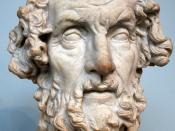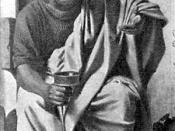The epistle from Horace's Art of Poetry was not merely a guide for good literature, but it was a sophisticated writing that displayed his principles and wisdom, and the contemporary Hellenistic influence on the Romans.
Horace's profound work clearly asserted his position as a literary master. Throughout his letter to Piso, he was able to make his description interesting and explanation convincing. He exhibited his expertise in literature by presenting detailed guidelines to write proficiently. Among his suggestions, he stressed precision, good iambic lines, and proper literary styles and formats. He also emphasized on the importance to strive for unity, as the writing would lose strength without coherence. If he were not a master at literature, he would not be able to discuss the technical details in depth. Furthermore, Horace was not only a man with distinguished achievements, but he was also a man with great principles. With many people yearning for success, he described Rome as "a nation greedy just for fame" (129).
He criticized the Romans for being indulgent and materialistic. Since everybody was so absorbed in earning money, he asked, "what poems can we expect to write worth coating with protective oils and storing in fine wood?" (129). To Horace, money was not the primary motivation to pursue his writing career, and that explained why Horace rejected Augustus's offer to become his secretary, which was an honorable position for a freed man. With his great virtues and morals, Horace was undoubtedly one of the best poets in the Roman Empire.
Horace's writings revealed the dominant Hellenistic influence. They were eloquent and highly intellectual, much nearer to that of the scholarly Greek writers of the Hellenistic period. He showed that he possessed deep knowledge of the Greek literature, since he often referred to Greek writers and to...


